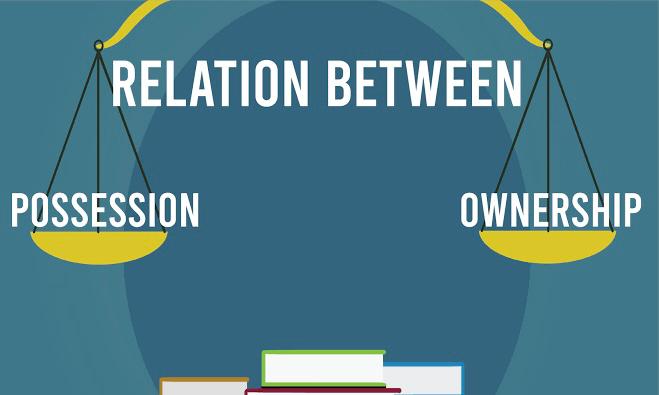 Ownership and Possession in Jurisprudence – Meaning, Essentials, Types, and Case Laws
Ownership and Possession in Jurisprudence – Meaning, Essentials, Types, and Case Laws
Ownership and possession are two core concepts in jurisprudence and property law. While often related, ownership is the ultimate legal right over a thing, whereas possession refers to physical control or holding of that thing.
This distinction is vital for law students, judiciary exam aspirants, and legal professionals because courts often decide property disputes based on these concepts.
Ownership – Meaning and Significance
Ownership means having legal rights over a property or object. It is not just physical control; it covers a bundle of rights, such as:
• Claiming possession
• Using and enjoying
• Transferring or disposing
• Protecting against interference by others
Salmond’s view: Ownership is a legal relationship between a person and a thing, which includes rights in rem (enforceable against the whole world).
Austin’s view: Ownership is a right against everyone, not limited by time, usage, or method of transfer.
Essentials of Ownership
1. Right of Possession
• Even if the owner is not in actual possession, the law recognizes their right to claim it.
Example: If M’s watch is stolen, M remains the owner and can recover it.
2. Right to Use and Enjoy
• Owner may:
• Manage the property
• Use it personally
• Earn income from it
These are liberties, not always strict legal rights.
3. Right to Consume, Destroy, or Transfer (Alienate)
• Owner can:
• Eat, use up, or destroy the thing
• Sell, gift, or mortgage it
(Subject to legal restrictions – e.g., land sale to foreigners may be restricted.)
4. Indeterminate Duration
• Ownership lasts until voluntarily transferred or abandoned.
• After death, it passes to heirs.
5. Residuary Character
• Even after granting rights to others (e.g., tenancy), the remaining rights stay with the owner.
Ownership vs. Possession
• Ownership = Legal title
• Possession = Actual holding or control
Example:
A landlord owns a house but the tenant possesses it.
A thief possesses a watch, but ownership remains with the lawful owner.
Encumbrances on Ownership
An encumbrance is a limitation or burden on ownership rights, where another person has some right over the property.
Common examples:
• Lease – Tenant’s right to occupy
• Servitude – Right of way over land
• Mortgage/Security – Creditor’s interest in property
What Can Be Owned?
Ownership is not limited to physical property. It can include:
• Physical assets – land, buildings, vehicles
• Rights – debt recovery, patent rights
• Investments – stocks, bonds
Salmond: Law protects rights, not objects directly — so ownership is always of a right.
How Ownership is Acquired
According to Salmond, ownership can be acquired:
1. By Law – Without any action (e.g., inheritance)
2. By Act/Event – Original acquisition (first-time possession) or derivative acquisition (purchase, gift)
Types of Ownership
1. Corporeal & Incorporeal – Physical things vs. rights
2. Trust & Beneficial Ownership – Trustee holds legal title; beneficiary enjoys benefits
3. Legal & Equitable – Indian law treats both equally
4. Sole & Co-ownership – Single owner vs. joint owners
5. Vested & Contingent – Absolute vs. conditional ownership
Possession – Meaning and Legal Recognition
Possession means having physical control over a thing with the intention to hold it.
Before law existed, possession was a natural fact; later, law started protecting it for maintaining peace and order.
Salmond: Possession is actual holding (possession in fact) + intention (animus possidendi).
Essentials of Possession
1. Corpus Possessionis (Physical Control)
• Ability to use and exclude others
• Confidence that interference will not occur
2. Animus Possidendi (Intention to Possess)
• Acting as if the property is one’s own
• Not necessarily believing you are the legal owner
• Savigny: True possession requires acting like an owner
Kinds of Possession
1. Corporeal & Incorporeal – Tangible items vs. rights
2. Immediate & Mediate – Direct control vs. control through another
3. Adverse Possession – Long, open, and hostile possession without permission can lead to ownership
4. Possession in Fact & in Law – Actual control vs. legal right to control
Modes of Acquiring Possession
• Taking – With or without consent of the possessor
• Delivery – Actual or constructive (surrender, transfer of legal control)
Legal Importance of Possession
• Evidence of Ownership – Presumed owner unless proven otherwise
• Adverse Possession – Can ripen into ownership
• Protection under Law – Section 6, Specific Relief Act protects possession from unlawful eviction
• Transfer of Ownership – Often through possession
Important Case Laws
1. Merry v. Green (1843) – No possession without intention
2. Armory v. Delamirie (1722) – Finder has rights against all except true owner
3. South Staffordshire Water Co. v. Sharman (1896) – Possession of land includes objects in it
4. Hannah v. Peel (1945) – Finder’s rights can prevail over absentee owner
5. Hibbert v. McKiernan (1948) – Trespasser cannot claim possession
Possessory Remedies
Possession is protected by:
• Criminal law – Prevents unlawful dispossession
• Tort law – Actions for wrongful interference
• Property law – Section 6, Specific Relief Act: Even unlawful possession cannot be disturbed without due process
Conclusion
Ownership and possession, though closely related, are not the same. Ownership gives complete legal rights, while possession is physical control with intention. Law protects both to maintain peace, order, and property security.
✓ To start your preparation for Judicial Services Examination at home, drop a message on WhatsApp +91 8840961324 or call us on +91 9151591324
At Theory of Abrogation, we equip you with everything you need:
•Subject-wise expert classes
•Mock test series
•Legal current affairs
•Personalized mentorship for interview preparation
“Your law degree is your foundation, but your preparation is what will build your success.”
Join Our New Batch Now!
Prepare smart. Prepare with Theory of Abrogation.
Contact Us:
B-109, Commercial
Complex Dr. Mukherjee
Nagar, Delhi-09
+91 9971399324 | +91 8840961324
[email protected]
